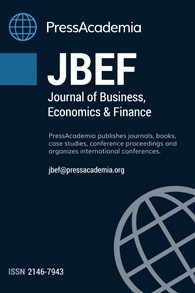THE GLOBALIZATION INDICATORS AND TOURISM DEVELOPMENT: A DYNAMIC PANEL-DATA ANALYSIS FOR MEDITERRANEAN COUNTRIES
Purpose- This study investigates how economic, social and political globalization indicators influence tourism development from 1995 to 2018 in the context of eight Mediterranean countries economies. Methodology- A group of econometric tests; regressions with ordinary least squares (OLS), fixed effects (FE), random effects (RE), dynamic OLS, fully modified OLS, and at the end, the GMM approaches have been estimated from panel data of this study to achieve accurate and unbiased results. Findings- Globalization factors categorized EG (economic globalisation), SG (social globalization) and PG (political globalization) exert positively significant and positive effects on tourism development in the selected countries’ tourism growth. An improvement in any one of these globalization factors would mean higher tourism growth in the countries. Conclusion- The results indicate that economic, social, and political globalization are significant factors for tourism development. Thus, this study proves that economic, social, and political integration of countries are significant driving forces behind their tourism development. Empirical findings propose that tourism sector significantly encourages economic growth. Also, the globalisation has a long-term relationship with tourism development.
Keywords:
Tourism development, globalization indicators, KOF Index, panel data analysis economic growth,
___
- Boğa, S. ve Erkişi, K. (2019). The relationship between international tourism receipts and economic growth in asia pacific countries: A panel data analysis. The Academic Elegance, 6(11), pp.31-46.
- Danish and Zhaohua Wang (2019). Dynamic relationship between tourism, economic growth, and environmental quality. Journal of Sustainable Tourism, pp.1-17. https://doi.org/10.1080/09669582.2018.1526293.
- Dreher, A. (2006). Does globalization affect growth? Evidence from a new index of globalization. Applied Economics, 38(10), 1091–1110.
- Dreher, A., Gaston, N., and Martens, P. (2008). Measuring globalisation - gauging its consequences. New York: Springer
- Dumitrescu, E.-I.; Hurlin, C. (2012). Testing for Granger non-causality in heterogeneous panels. Economic Modelling, 29(4),1450-1460
- https://doi.org/10.1016/j.econmod.2012.02.014 .................
- Gygli, Savina, Florian Haelg, Niklas Potrafke and Jan-Egbert Sturm (2019). The KOF Globalisation Index – Revisited. The Review of International Organizations, 14(3), 543-574. https://doi.org/10.1007/s11558-019-09344-2
- Harun, A. and Eko, Suprayitno (2012). The important factors of tourism development in Singapore. https://www.researchgate.net/publication/322910876,1-15. doi: 10.18860/iq.v0i0.1736
- Holzner, M. (2011). Tourism and economic development: The beach disease?. Tourism Management, 32(4), 922–933. https://doi.org/10.1016/j.tourman.2010.08.007
- Javid, Elyeh and Salih, Katircioglu (2017). The globalization indicators-tourism development nexus: a dynamic panel-data analysis, Asia Pacific Journal of Tourism Research, DOI: 10.1080/10941665.2017.1378240
- Kosolapov, N.A .(2001). The international political organization of the globalized world: models for a medium-term prospect. Social sciences and modernity, 6, 141-143.
- Kum, H., Aslan, A. and Gungor, M. (2015). Tourism and Economic Growth: The Case of Next-11 Countries. International Journal of Economics and Financial Issues, 5(4), 1075-1081.
- Nowak, J.J. and Petit, Sylvain and Sahli, Mondher. (2013). Globalisation in tourism: A Theoretical and empirical trade examination. 1-51, 10.1142/9789814327084_0025 https://www.researchgate.net/publication/305147345.
- Pesaran, M. H. (2004). General diagnostic tests for cross section dependence in panels. Cambridge Working Papers in Economics 0435, 3, 1–39. doi:https://doi.org/https://ideas.repec.org/p/cam/camdae/0435.html
- Ren, Taizeng, Can, M., Paramati, S. R., Fang, J., and Wu, W. (2019). The Impact of Tourism Quality on Economic Development and Environment: Evidence from Mediterranean Countries. Sustainability, 11(8), 2296. MDPI AG. Retrieved from http://dx.doi.org/10.3390/su11082296
- Roser, Max (2020). "Tourism". Published online at OurWorldInData.org. Retrieved from: https://ourworldindata.org/tourism
- Seetanah, B. (2010). Assessing the Dynamic Economic Impact of Tourism for Island economies. Annals of Tourism Research, 38(1), 291-308.
- Sevinç, Deniz, Öz-Yalaman, G. ve Güven, S. (2019). The impact of globalization on corporate taxation: evidence from the kof globalization index. Journal of Research in Economics, Politics and Finance, 4(3): 350-369.
- Shahzad, S. J. H., Shahbaz, M., Ferrer, R. and Kumar, R. R. (2017). Tourism-led Growth Hypothesis in the Top Ten Tourist Destinations: New Evidence Using the Quantile-on-Quantile Approach. Tourism Management, 60, 223-232
- Tang, C.F. and Abosedra, S. (2014). The impacts of tourism, energy consumption and political instability on economic growth in the MENA countries. Energy Policy, 68, 458–464. https://doi.org/10.1016/j.enpol.2014.01.004
- Trunina, I. M., Olena, Anatoliivna Sushchenko , Viktoriia, Valeriivna Druzhynina and Olena Leonidivna Zahorianska (2020). Globalization impact on the world travel market development, SHS Web of Conferences 73, 01029. https://doi.org/10.1051/shsconf/202073010 29
- Tugcu, C.T. (2014). Tourism and economic growth nexus revisited: A panel causality analysis for the case of the Mediterranean Region. Tourism Management, 42, 207–212. https://doi.org/10.1016/j.tourman.2013.12.007
- Westerlund, J. (2007). Testing for error correction in panel data. Oxford Bulletin of Economics and Statistics, 69,709–748. doi:10.1111/j.1468-0084.2007.00477.x
- Yayın Aralığı: Yılda 4 Sayı
- Başlangıç: 2012
- Yayıncı: PressAcademia
